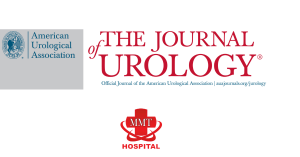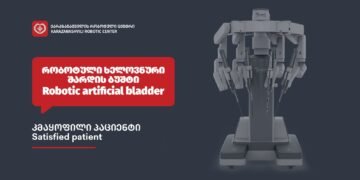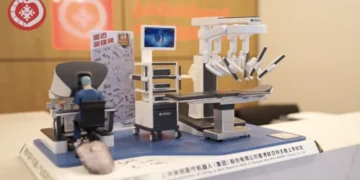Abstract
INTRODUCTION AND OBJECTIVE:
Radical cystectomy remains the gold standard for the management of invasive bladder cancer. However, postoperative complications of this complex surgery still remain the major problem, which ranges between 30-64%. Neobladder extra-peritonization as a method for reduction of postoperative complications was discussed by few authors, showing that it has the potential to reduce the complication rate. In 2018 a video-description of the new technique of peritoneal cavity sparing (Karazanashvili, G. (2018)) was presented at AUA annual congress. We aimed to investigate the role of this new technique in the reduction of the RCP postoperative complications.
METHODS:
In 2011-2016 years 98 RCP were performed using the standard transperitoneal descending approach, leaving just a partially extra-peritonized neobladder in the peritoneal cavity. In 2016-2020 years 60 patients underwent RCP using the new technique – peritoneal cavity sparing extraperitoneal RCP with extraperitoneal orthotopic neobladder formation: RCP was performed in a retrograde manner, from apex prostate to the bladder pedicles and the dome; peritoneum was detached from bladder wall and peritoneal cavity hermeticism was kept until complete removal of the specimen and until completion of extended lymphadenectomy. So the peritoneal cavity remained untouched for the most part of the operation. After the creation of the neobladder, it was completely extra-peritonized; the peritoneal cavity was closed almost hermetically (hiatus was left only for neobladder mesentery) without drains. Complication rates after the operations were calculated according to the Clavien-Dindo scale.
RESULTS:
The retrospective analysis of complication rates has revealed that Clavien-Dindo Grade 1 to 3 intestinal complications significantly decreased using the new RCP technique compared to the old – standard one: Postoperative ileus medical treatment rate decreased from 3% to 0%; Intra-abdominal urine leakage – from 2.2%to 1.69%; Ileus surgical intervention – from 10.8% to 5.08%; Ileal anastomosis leakage from 5.7 to 0%; Evisceration – from 2.7% to 0%. Thus Intestinal Grade 1 complications decreased from 5.2% to 1.69 and Grade 3 complications – from 18.7% to 5.08%; totally the intestinal complication rate decreased by 17.22% (from 23.9% to 6.77%), however prolonged lymphorrhea rate increased by 12.54% (from 7.8 % to 20.34%).
CONCLUSIONS:
Peritoneum cavity sparing extraperitoneal RCP and extraperitoneal orthotopic neobladder formation can lead to notable reduction of RCP postoperative intestinal complication rate in price of prolonged lymphorrhea. See details








